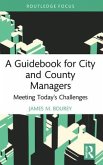This book provides a guide to becoming an empowered citizen, capable of achieving success when advocating with local government. Based on interviews with mayors, together with documentary evidence, analyses of public meetings, and the author's own experience of advocacy, volunteering on city committees, and work on political campaigns, it describes how to advocate with local government officials, whom to contact, what to say when and where, and how to locate the facts, figures, and stories that can lend credence to an advocacy campaign. Guided by the ideas that persuasion efforts can succeed, are not difficult to undertake, and are in fact appreciated by public officials; that the system is open and that citizens have a fair chance of advancing their point of view; and that democracy depends upon citizen engagement, it presents concrete case studies in order to illustrate the guidance provided. With advice on how to organize and implement a successful advocacy campaign at a local level-and what to avoid-Persuading Local Government provides an antidote to the alienation of national politics, showing that local efforts at persuasion are meaningful and effect change on matters that affect people's everyday lives.
Bitte wählen Sie Ihr Anliegen aus.
Rechnungen
Retourenschein anfordern
Bestellstatus
Storno








